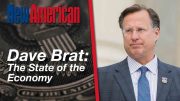
The Associated Press got a sneak preview of the soon-to-be-released Census Bureau’s take on the economy, and were muted in their enthusiasm. On the surface, the numbers looked pretty good: Americans are moving again, more young people are moving away from home, and the precipitous decline in the birth rate is slowing.
Andrew Cherlin, a professor at Johns Hopkins University, was tentative: “We may be seeing the beginning of the American family’s recovery from the Great Recession,” while Richard Freeman, an economist at Harvard, said the data show only a “fragile recovery” from the longest recession since FDR.
The numbers supporting such strained enthusiasm were unimpressive. Just 12 percent of the nation’s population moved to a new home, up from 11.6 percent last year. Even among the most mobile cohort, young adults between 25 and 29, 24.6 percent of them moved to a new residence compared to 24.1 percent a year ago. Such improvements are scarcely statistically significant, but the commentators were trying to see the positives.
Mark Mather, an associate VP at the Population Reference Bureau, was hard-pressed to put a smiley face on the Census Bureau’s upcoming report:
There are signs that young adults have turned a corner. More young adults are staying in school, which will increase their potential earnings when the job market bounces back. It’s going to take some time, but we should see more young adults entering the labor force, buying homes and starting families as economic conditions improve.
Mather assumes, of course, that by staying in school (and out of the employment statistical database) they will be able to earn higher incomes down the road. Increasingly that assumption has been called into question in light of the moribund economy. And his comment about “when the job market bounces back,” is the most problematic assumption of all.
The most frothily optimistic comment came from a demographer at the Brookings Institute, William Frey, who said:
There are signs among all these measures that the multiple downsides of the Great Recession have bottomed out, which is good news, especially for young people who have seen their lives put on hold. There is some light at the end of the tunnel.
For Fred Smith, founder and CEO of the world’s largest international air shipping company, Federal Express, who does real work in the real world, the light at the end of his tunnel is dimming. Two weeks ago his company cut its earnings expectations, and then followed that up with a downbeat report on Tuesday of significantly lower earnings and revenues for its first quarter. It also was forced to reduce its outlook into 2013, citing the weak economy for forcing its customers to shift towards cheaper shipping options, like sea-going carriers.
As important as FedEx is as a leading indicator of economic activity, perhaps nothing is more important than the use of energy by the economy. In a private e-mail from James Beck, lead analyst of the Weekly Petroleum Supply Team at the Energy Information Administration (EIA) to Mish Shedlock, author of Mish’s Global Economic Trend Analysis, Beck provided an inside look at the economy. Mish wrote about the e-mail: “James gave me permission to use his name and his charts as long as I mentioned that his email reflects his personal opinions [and] not necessarily those of the EIA.”
With that caveat, it’s helpful to review how the world looks to Beck whose team looks at “total petroleum demand,” which includes gasoline, diesel and heating oil, and kerosene jet fuel (or Kjet). His charts are not pretty. Wrote Beck:
The following commentary is from me as a private citizen, not as a spokesperson of the Energy Information Administration or the Department of Energy:
Total petroleum product demand is at 1997/98 levels….
Total demand … remains significantly below 2010 and 2011 levels….
This 15 years of demand destruction cannot be explained fully by increased efficiency or increased use of biofuels and renewables (these have, at most, a marginal effect). This is truly an indication of the real and continuing trouble in our economy, high unemployment and underemployment, loss of manufacturing, and reduction of shipping….
Demand for gasoline continues to be below 2002 levels and the lowest level for April – June since 2001….
Demand for jet fuel has also fallen dramatically from 2007/08.
He concluded his review of his charts with this sobering assessment:
These numbers do not tell me that we are in a recovery. Despite increases in distillate and KJet demand in 2010 and 2011, and in gasoline in 2009 and 2010, these were well short of recovering from the decline in 2008/09. The decline year-over-year in these three core transportation indicators suggest a slowing in the economy if not a recession.



